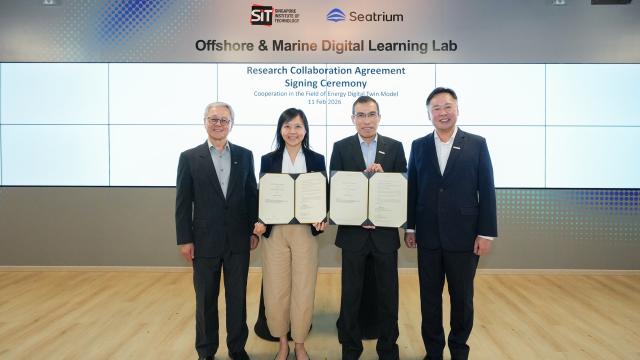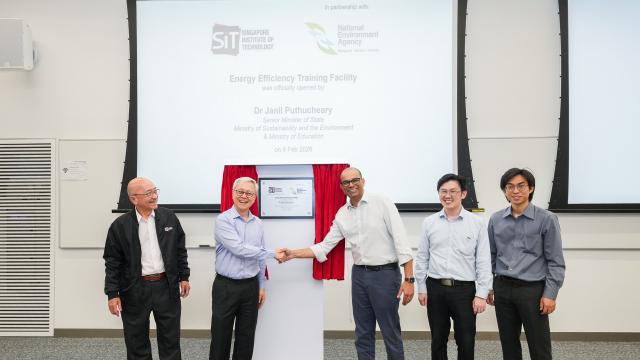Centred on the main theme of ‘Supporting Industry Transformation through Upskilling Singapore’s Workforce’, this year’s SkillsFuture Month@SIT featured more than 50 online workshops across six core themes.

SkillsFuture Month@SIT (SFM@SIT) saw close to 11,000 participants across 51 online workshops looking to upskill and reskill to stay relevant and employable. Insights from industry leaders and institutes of higher learning were shared during keynote sessions and online workshops in areas including Digitalisation, Smart Manufacturing, Health and Food, Business, Law and Finance, as well as Community and Social Services. The event, held on 4 August, was organised by SkillsFuture Singapore (SSG) and SIT, and is part of SkillsFuture Month, which runs from 8 July to 22 August.
If you have missed the workshops, you can catch them from 23 August 2021 to 12 July 2022 on the SFM@SIT microsite. Here are some key learning points from the six online workshops, featuring experts from SIT:
1. Identifying Transferable Skills for Career Planning by Associate Professor Lee Chien Ching
A growth mindset is critical and includes believing that ability is something you can improve on through practice; viewing constructive feedback as a chance to improve; focusing on a journey of continual improvement; and innovating through creative risks. From a growth mindset perspective, switching jobs is an opportunity to grow and broaden one’s skills in another job context.
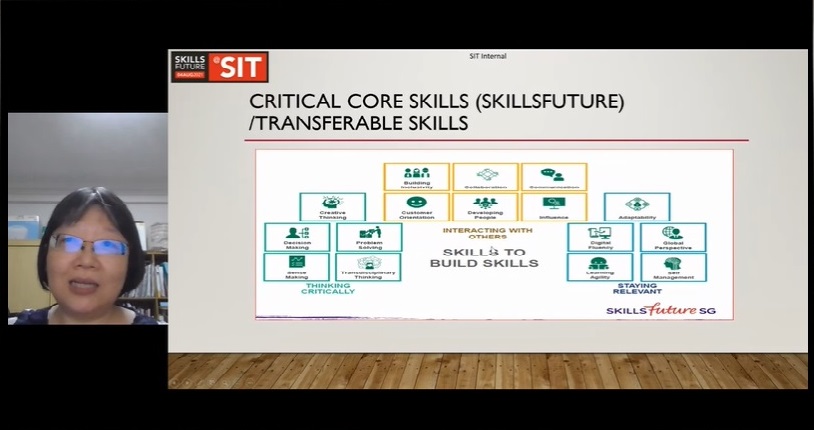
Critical Core Skills from the Skills Framework.
Participants were given an overview of Critical Core Skills from the Skills Framework that workplaces deem most essential. These transferable skills fall under three categories: thinking critically, interacting with others, and staying relevant. The framework can also be used for career planning.
2. Preparing for a Job Switch, Respectively Re-enter the Job Market with CET Programmes by Associate Professor Detlev Remy
The service industry is currently facing massive challenges and changes post-COVID. The new norm will be digitalisation and data analytics, for example in marketing, revenue management and distribution strategies.
There will also be more disruptions, such as the entry of more non-industry players like Airbnb and Amazon, as well as the need to re-think business models in the areas of revenue and space utilisation, and customer orientation.
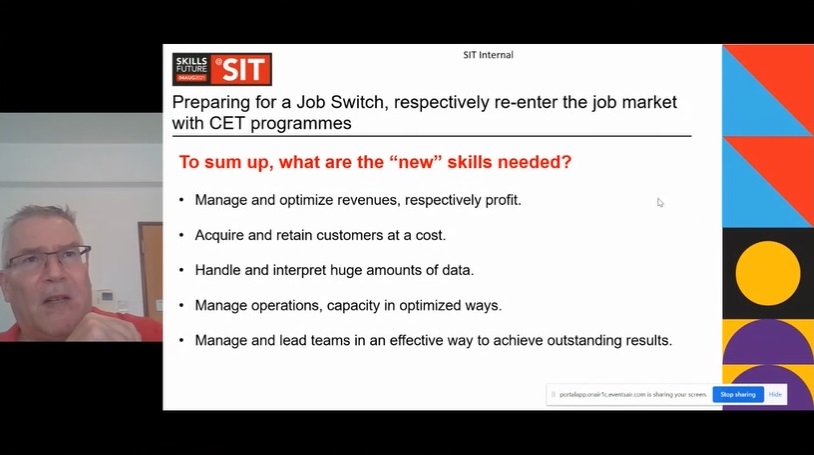
The new skills needed in the service industry, post-COVID.
The new skills that are needed in the service industry include: manage and optimise revenues and profit; acquire and retain customers at a cost; handle and interpret huge amounts of data; manage operations and capacity in optimised ways; and manage and lead teams in an effective way to achieve outstanding results.
“What does it mean for job-seekers? Learn, unlearn, re-learn,” said A/Prof Remy. “Be agile and adapt to new work practices, be willing to constantly learn and look for adequate training – on ‘much needed’ areas of training.”
3. Data Visualisation for Intuitive, Informative, and Interactive Data Analytics by Assistant Professor Zhang Wei
Data is everywhere and one of the ways to deal with data is to use data visualisation, which is a graphical representation of data. “While data visualisation is not a high-tech solution, it also does not cost too much,” said Asst Prof Zhang Wei. “Humans love visuals and it’s really fast for us to digest the information from a figure or graph.”
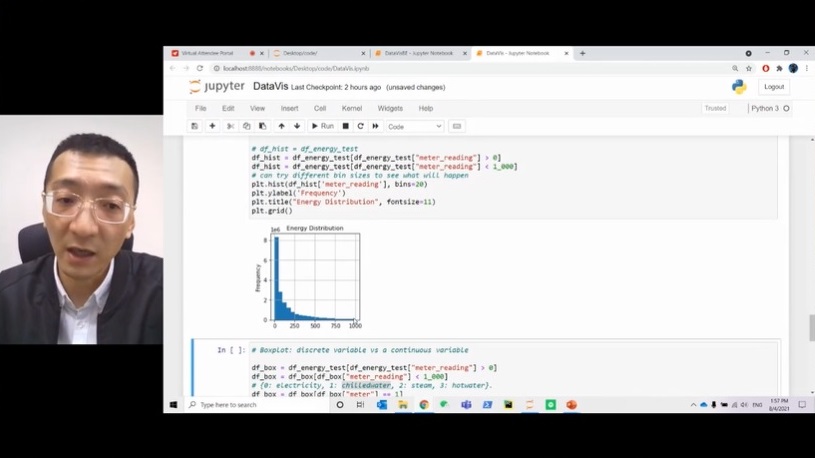
The Python demonstration.
Workshop participants were given a demonstration on how to use Python for data visualisation, including popular methods such as bar chart, histogram and scatter plot. Visualisation can be used for raw data, intermediate data and to extrapolate final results, including adding sensitivity to parameters and using explainable artificial intelligence.
4. Using SIRI as a Key Enabler for Smart Manufacturing by Associate Professor Yee Fook Cheong
Not to be mistaken with Siri, the voice assistant on Apple devices, the Smart Industry Readiness Index (SIRI) was created by the Singapore Economic Development Board and comprises a suite of frameworks and tools to help manufacturers start, scale, and sustain their manufacturing transformation journeys. SIRI covers the three core elements of Industry 4.0: Process, Technology, and Organisation.
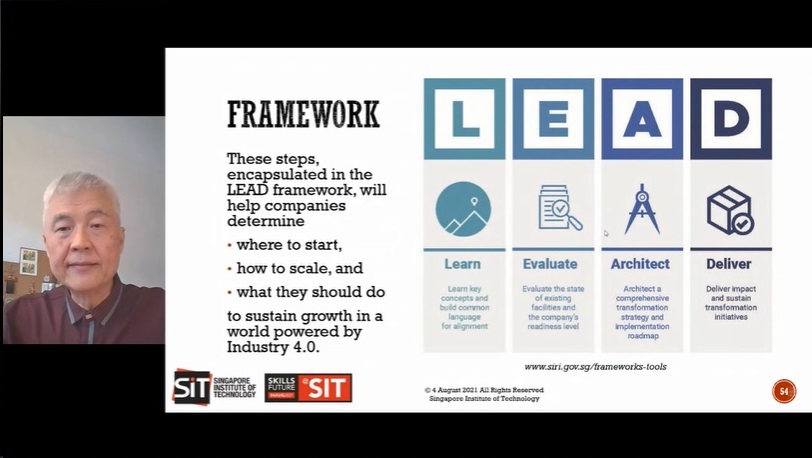
The SIRI framework.
In this workshop, A/Prof Yee shared how SIRI can be deployed as a system tool to enhance the performance of manufacturing companies. Some useful tools are self-assessment, which identifies strengths and areas for improvement, and the capability maturity model integration assessments, which prompt appropriate action by showing both the current status, and what needs to be done next to advance up the maturity curve.
5. Upskilling of Electrical Power Engineering Professionals for Singapore’s Energy Future by Professor Tseng King Jet
In the next 50 years, Singapore needs to ensure a clean, affordable and reliable energy future. One way to accomplish this is through energy efficiency. Electrical power engineering professionals will need to have skills in areas including renewable energy; solar photovoltaic and energy storage systems project development; asset operation and maintenance; microgrids; energy efficient technologies; and electric vehicle charging systems.
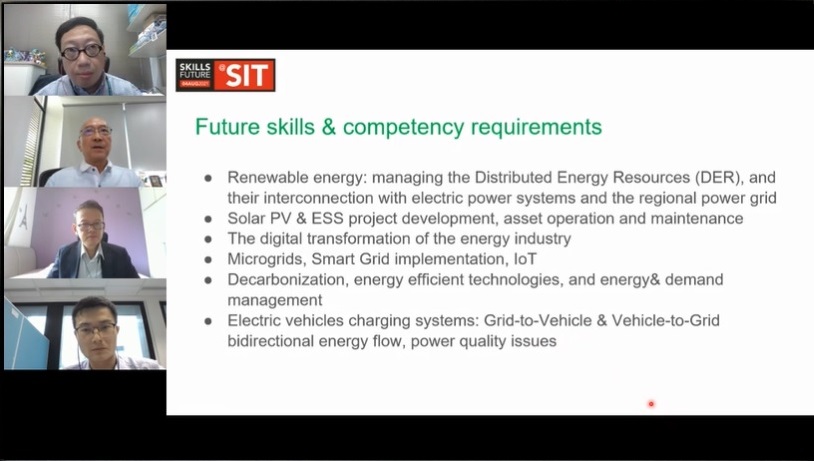
The future skills and competencies required for electrical power engineering professionals.
Participants were also given a rundown of the energy-related courses provided by SIT, SP Group and Singapore Polytechnic to upgrade their skills.
6. So, You Want to Work in Cyber Security by Assistant Professor Goh Weihan
The cyber security field offers careers in security engineering; education and training; blue team; governance, risk management and compliance; and security testing and red team. In planning a cyber security career, participants were advised to: understand the job description; be open to options; make time for learning; and having the right mindset to learn beyond the job.
“If you want to work in cyber security, you’ve got to ask yourself, do you do anything outside of your work to improve yourself?” said Asst Prof Goh. “If you face a problem, how well you respond to a problem, matters.”
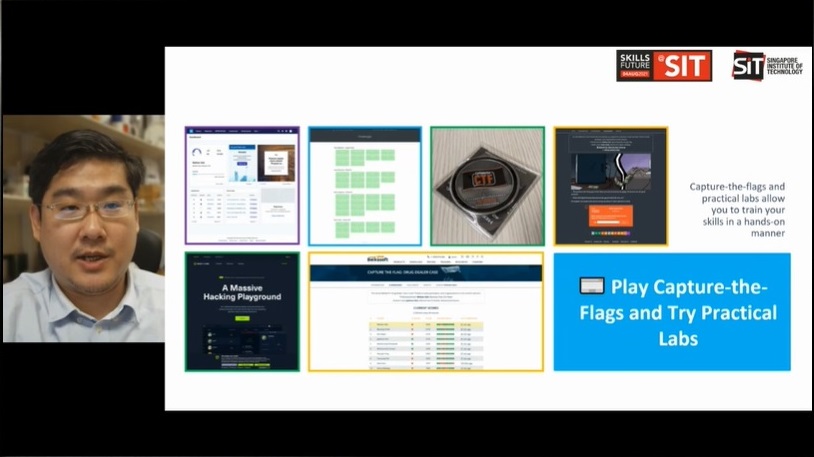
Potential job seekers should improve their knowledge of cyber security through means such as playing capture-the-flag and trying practical labs.
Those looking for a career in the field are likely to have knowledge in computing and policies; engage in cyber security in everyday life; are adept at communicating and working with others; and may have experience leading teams. If participants want a foot in the door, they should: get involved with the community; leverage available resources; attend training; get certified; as well as play capture-the-flag and try practical labs, which provide hands-on cyber security training.















![[FA] SIT One SITizen Alumni Initiative_Web banner_1244px x 688px.jpg](/openhouse2025/sit-teaching-and-learning-academy/centre-professional-communication/sit-teaching-and-learning-academy/sit-teaching-and-learning-academy/sit-teaching-and-learning-academy/openhouse/sites/default/files/2024-12/%5BFA%5D%20%20SIT%20One%20SITizen%20Alumni%20Initiative_Web%20banner_1244px%20x%20688px.jpg)

